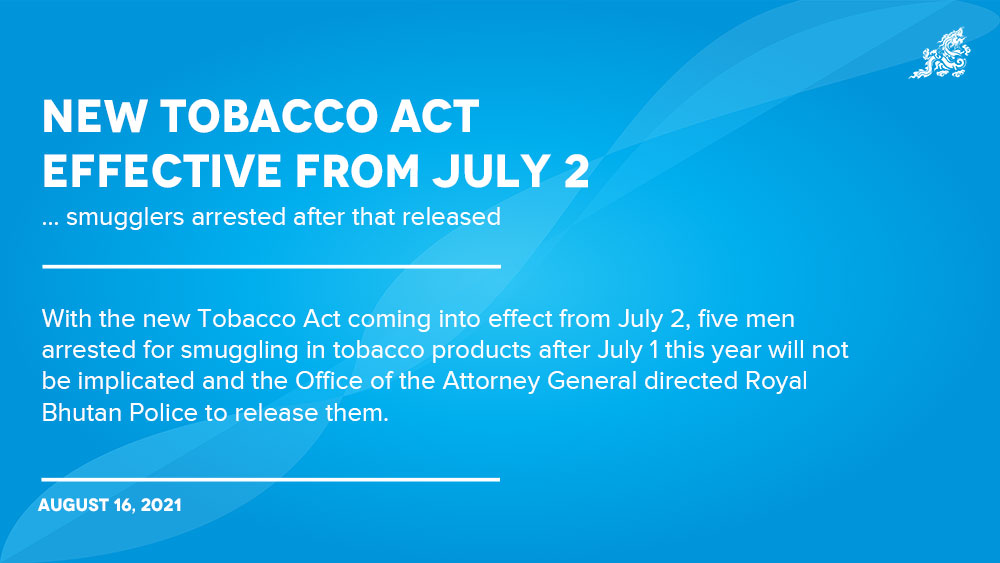… smugglers arrested after that released
Yangchen C Rinzin
With the new Tobacco Act coming into effect from July 2, five men arrested for smuggling in tobacco products after July 1 this year will not be implicated and the Office of the Attorney General directed Royal Bhutan Police to release them.
As Bhutan Narcotics Control Authority (BNCA) continues to work on the revision of tobacco rules and regulations 2011, they were released.
Police, however, seized their tobacco consignments worth almost Nu 2.06 million and was handed over to the BNCA.
The Tobacco Control (Amendment) Act of Bhutan 2021 came into effect on July 2 following Royal’s assent. The National Assembly passed the Act on June 25.
The new Act allows sales, distribution, buying, possessing, and transportation of tobacco or tobacco products in the country.
The Tobacco Act was amended in the summer session as an urgent Bill in view of the continued smuggling of tobacco products through the porous border in the south. It was identified as one of the main reasons for the spread of the Covid-19 virus in the country.
Although police recorded about 15 cases in relation to the smuggling of tobacco products, only nine cases were recorded between July 1 and August 3. Five people were released. Another four people were involved in the alleged smuggling of narcotic drugs along with tobacco products. Two have been sent on bail on surety.
Of the total cases, two were arrested from Zhemgang for allegedly smuggling 78 sticks of cigarettes and 304 bidi sticks worth Nu 38,000. Another four were arrested from Thimphu with 74,940 sticks of cigarettes and 708 packets of chewing tobacco worth Nu 2.23 million.
Three cases were from Phuentsholing where they were arrested with 15,000 sticks of cigarettes, 85,160 packets of chewing tobacco, and 137,800 sticks of bidi worth Nu 2.34 million.
An arrest of a person in Thimphu helped police establish the modus operandi of cross-border smuggling of tobacco from Jaigaon in India to Phuentsholing and then on to Thimphu involving non-Bhutanese across the border.
The officer said that the tobacco products including narcotic drugs were smuggled through the import of essential goods where drugs or tobacco were concealed inside the items.
However, police could not find the Bhutanese who received these products. While some drivers who delivered the goods were involved, many of them had no idea about the items and were not related to the smugglers.
“As usual we found in this case how the non-Bhutanese person used both Bhutanese telecom SIM cards,” a Police official said. “The investigation is often hampered when we’re unable to get details. The head of the crime branch should be at least allowed to get phone call details with certain conditions. It should be looked into.”
Meanwhile, with the new Act in effect, the BNCA who is responsible to develop the rules and regulations is still reviewing the rules and regulations 2011.
The regulation would state clearly who would be able to import or sell tobacco or if it would identify designated sellers, among many things.
BNCA’s officiating director general Ugyen Tshering said that until the final rules and regulation is out, the interim arrangement the economic affairs ministry has decided would still stand.
The ministry’s August 5 letter states that all micro general shops including pan shops and grocery retail license holders would be allowed to sell as well as import tobacco and tobacco products to avoid illegal trade and sale.
It also states that while Bhutan Duty-Free Limited could continue to be one of the dealers, new private dealers and wholesalers would be encouraged to obtain the license.
Ugyen Tshering said that the office expected to complete the revision of rules and regulations by December.
“Although we used to burn the seized tobacco products before the Act was amended, as for now, it is unclear what to do with the recently seized tobacco products,” he said. “We’ll look into such matters during the revision.”
However, he said, people cannot smoke in open or public areas, but in designated smoking zones.
If a person is found crossing the border illegally along the Southern border and also bringing in tobacco products, the person would be now implicated only for illegal entry.
Between January 2020 and June 2021, police recorded 162 tobacco smuggling cases that brought in 526,213 sticks of cigarettes, 753,713 sticks of bidis, and 3,193.2kg of Baba and other tobacco products.
Edited by Tshering Palden


